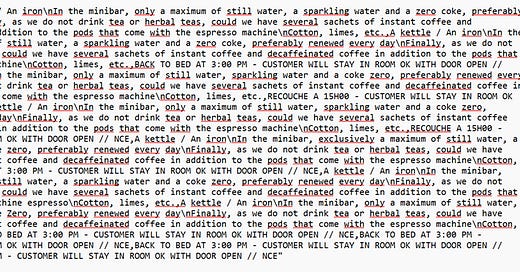HA.LLU.CI.NATION
Important note : this article has been written by a RI (Real Intelligence) and not an AI ;=)
AI has gotten a lot of hype recently...i’m sure you are all using ChatGPT, mastering the science of the prompt. Me too… to be honest…
But since this is a true revolution and because it is my new daily focus, I decided as a Hotel Tech CEO (Roomchecking.com) and longtime developer to blog about AI and the Hotel industry.
What’s amazing about AI is that it used to be interesting only for developers and engineers, but now everyone needs to learn about it.
Therefore I'd like to share some knowledge I discovered, some research I made and some deep work I’m doing on AI for the Hotel industry. I love to share my knowledge.
So if you like it, feel free to tell me and pass it to others.
No hype, no selling, just good information (hopefully)
The Usual Approach to Understanding Texts
When you think about it, Artificial Intelligence has been around for more than 30 years, but suddenly last year, it was the revelation like Moses revealed the Ten Commandments to the world.
I’ll take one problem I tackle with every day with hotels: the Pms notes, the traces…
They come as a block, sometimes with repetitions, strange formatting… the notes are as busy as my clients ;=)
As I needed to extract from those text blocks what the team needs to do (tasks and notes), I used what we called Natural Language Processing (NLP). It consisted of (and still) of extracting words from a sentence and “qualify it”. We called this an Entity.
This is a simple example :
Elon Musk is a Person, Twitter is a company…
It works, somehow, but we all know the chatbots in the hotels. They are more or less limited, sometimes answering completely out of context… Well it is very hard to understand …context
Imagine asking this question : when can I go swimming? The system needs to understand that swimming is about the pool, when it is a time request.
This is where AI with ChatGPT and LLM came to the world.
And the way it works is just…amazing.
Switching the approach : I don’t know what I’ll tell next.
Yes, you read well. The AI is not pre-conceiving the answer it produces. The words come one after the other as a prediction.
Plato and Wittgenstein, the two great philisopher who wrote about thought and language would be shocked to hear that…
So now the machine will reason with statistics, and it means that the reasoning is actually prediction… A prediction that will take its knowledge from a set of data pre- trained (I’ll write on that in another blog)
I did not read it anywhere but I’d like to call it : Fast Forward thinking
Here is an illustration:
As you can see this sample : Paris is a city in ____
Statistically“France” appears in 17% of the answers on the web (I find it low, but anyway…).
A key ingredient of the LLM revolution is that for the first time very large models could be trained directly on raw, messy, real-world data, without the need for carefully curated and human-labeled data sets.
As a result almost all textual data on the web became useful. The more, the better. Today’s LLMs are trained on trillions of words. Imagine digesting Wikipedia wholesale, consuming all the subtitles and comments on YouTube, reading millions of legal contracts, tens of millions of emails, and hundreds of thousands of books. This kind of vast, almost instantaneous consumption of information is not just difficult to comprehend; it’s truly alien(1).
This explains the success of Nvidia (used to process the data), and it’s stock price drop when DeepSeek, the Chinese LLM, proved one could train a model for a fraction of the price. Investors got panicked that Nvidia will not sell their chips as much as expected…
Hallucination
Remember that LLMs work by predicting the most likely words to follow the prompt you gave it based on the statistical patterns in its training data. It does not care if the words are true, meaningful, or original. It just wants to produce a coherent and plausible text that makes you happy (the 17% for France). Hallucinations sound likely and contextually appropriate enough to make it hard to tell lies from the truth.
It can be funny when the AI fails to distinguish when fiction bleeds into reality. For example, Colin Fraser, a data scientist, noted that when asked for a random number between 1 and 100, ChatGPT answered “42”1 10 percent of the time. If it were truly choosing a number randomly, it should answer “42” only 1 percent of the time. The science fiction nerds among my readers have probably already guessed why 42 pops up so much more often.
In Douglas Adams’s classic comedy The Hitchhiker’s Guide to the Galaxy, 42 is the answer to the “ultimate question of life, the universe, and everything” (leaving open a bigger issue: What was the question?), and the number has become a shorthand joke on the internet. Thus, Fraser speculates that there are a lot more 42s for the AI to see than other numbers, which, in turn, increases the likelihood that AI will output that number—while hallucinating that it is giving you a random answer.
In the next article, I’d like to explain how to battle hallucination.
Don’t hesitate to tell me if you want to see something else jweizman@roomchecking.com
(1)Suleyman, Mustafa; Bhaskar, Michael. The Coming Wave: AI, Power and Our Future: The instant Sunday Times bestseller from the ultimate AI insider (English Edition) (p. 65). Random House. Édition du Kindle.






